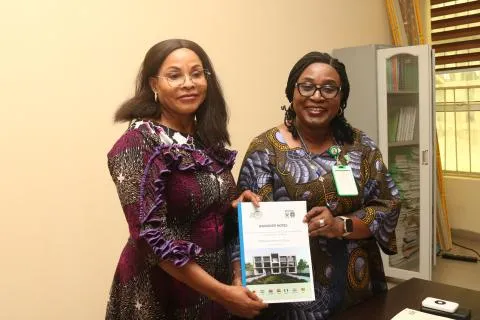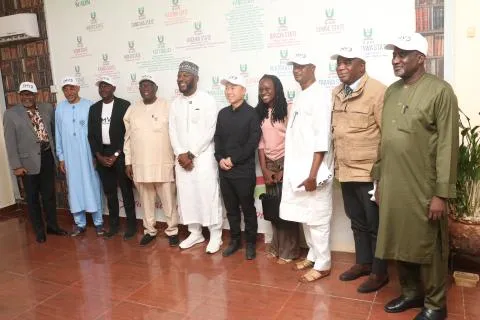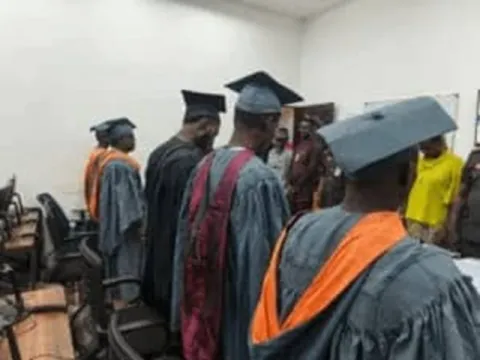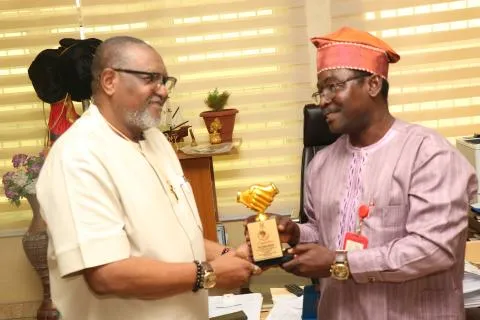VC Peters Delivers Speech At Unisa’s 150th Anniversary Confab
The Vice-Chancellor of the National Open University of Nigeria (NOUN), Prof. Olufemi Peters, has urged the University of South Africa (UNISA) to take the lead as 'infant' institutions in Open and Distance Learning continue to spring up across the continent. The Vice-Chancellor delivered this keynote talk on Monday in Johannesburg, South Africa, at the UNISA 150th Anniversary Gala Dinner.Peters was invited to the University of South Africa 2023 MoodleMoot Africa Conference, which will be held at the Emperors Palace Hotel in Johannesburg, South Africa, from August 20 to 22, 2023, as one of the primary events commemorating the university's 150th anniversary.
History has shown that there are rewards for spreading the gospel of ODL, he stated. Consider the United States of America, the People's Republic of China, or the Russian Federation. Humility may not be the most lucrative posture in a competitive business. As a result, UNISA is compelled to push its influence across Africa, increasing access to education through its great depth, competence, and capability.
This brings me to the current issue of academic program offerings, which is a result of the post-COVID-19 pandemic era. One of the most valuable features of ODL is the flexibility it provides within a certain environment. A recent finding resulting from NOUN's usage of learning analytics revealed that flexibility via ODL is the primary reason driving increased access to our school. Flexibility includes program offerings, delivery processes, and mechanisms, as well as program duration. What remains is the program or course format flexibility that we can provide.
In this regard, I'd like to talk about micro-credentials, Peters continued. Although there is no universal agreement on the definition of a micro-credential, I agree with Oliver's (2019) concise description, which defines micro-credentials as digital certification of assessed knowledge, skills, and competencies in a specific area or field. These may be part of an authorized program or stand-alone courses that help learners with their professional, technical, intellectual, and personal growth.
Notably, micro-credentials are reshaping higher education, with institutions acknowledging their potential as new learning pathways, a trend especially visible in countries like England, the USA, Canada, and Australia (Ruddy and Ponte, 2019, Cabral, 2021). In Africa, South Africa has been singled out as the most active country on the continent and one of the most active in the entire world regarding micro-credentialing (World Economic Forum, 2017).
In Asia, the Malaysian Qualifications Agency (2020) emphasizes micro-credentials as tools for lifelong learning-re-skilling and up-skilling-aligned with industry and societal needs, frequently surpassing traditional degrees in dynamism, competitiveness, demand responsiveness, brevity, and cost efficiency, he explained. Access, stackability, and acknowledgement of non-formal learning are further advantages. Shouldn't it be possible for a person to accumulate a large number of micro-credentials and convert them into academic credits toward an undergraduate, postgraduate, or any other accredited program? Shouldn't higher education institutions be in charge of facilitating this process?
Micro-credentials serve as a channel to boost enrollment, provide an avenue for additional revenue generation, and enable institutions to align with learners' evolving needs in a rapidly changing knowledge and skills landscape. The previous non-flexible credentials simply do not function in non-flexible domains. Micro-credentials have the potential to fill skill gaps in both current and future labor markets. They enable students to specialize in certain skill areas or themes, which is particularly relevant in an age where artificial intelligence, automation, and connectivity are reshaping sectors and creative pedagogies are becoming more crucial. We must consider how we might encourage critical thinking, creativity, and problem-solving abilities. And how can we encourage active participation in our society as opposed to passive information consumption?
Undoubtedly, incorporating this notion into traditional degree-awarding university systems will present some difficulties. The most significant of them are the legislative and legal barriers associated with micro-credentials. Will regulatory bodies approve this program reorganization? It is incumbent on organizations like UNISA, which act as market elders, to support this cause. I am pleased to report that I have lately begun this conversation in my own nation. However, there is reason to be optimistic. UNISA is heading in the right direction. We've convened here at UNISA's request to try out Moodle, a Learning Management System platform.
Meeting Dr. Martin Dougiamas, the founder and CEO of Moodle, in person was one of the highlights of this conference for me. Indeed, NOUN is one of Africa's biggest Moodle users, with over 150,000 active students. It also contains over 2,100 courses that students may access via the NOUN Moodle platform. In addition, approximately 100 study centers in Nigeria employ locally installed Moodle instances for evaluation.
MoodleMoot should be more than just a conference; it should epitomise a convergence of minds, a nexus of ideas, and a platform where educators, technologists, and visionaries unite to share insights, best practices, and aspirations. As we come together under the banner of Moodle, we stand on the precipice of transforming education, harnessing the power of digital platforms to redefine how knowledge is acquired, shared, and utilised.
Imagine an e-learning ecosystem designed by Africans for Africans. An ecosystem that leverages technology to overcome the challenges of geographical barriers, connectivity, and resource limitations; an ecosystem that empowers educators to craft locally relevant content that resonates with the diverse cultures and languages that define Africa. As we strive for a sustainable e-learning ecosystem, let us recognise that innovative pedagogies hold the key to unlocking our students’ potential.
Tailoring education to the African context means integrating our rich cultural heritage, languages, and traditions into the curriculum. It means encouraging collaborative learning, fostering a spirit of entrepreneurship, and nurturing the skills that will define our success in the era of the Fourth Industrial Revolution and beyond.
Building a digital ecosystem in Africa using Moodle presents exciting opportunities to transform education across the continent. Permit me to highlight a few ideas that I believe may also have been echoed throughout the conference. Peters further posited that How about having Peer-to-Peer Learning Initiatives, learning analytics, and personalized learning, and implementing multilingual capabilities to accommodate the diversity of languages spoken across Africa, ensuring that language is not a barrier to accessing quality education?
Building a digital ecosystem in Africa requires a collaborative effort that aligns with the unique challenges and opportunities of the continent. By leveraging Moodle’s versatile features and engaging with local stakeholders, a transformative educational landscape can be cultivated for the benefit of African learners.
Ladies and gentlemen, as we embark on this collective journey of exploration, collaboration, and innovation, let us not only celebrate the achievements of the past but also envision the limitless possibilities of the future. Let us harness the flexibility of the Moodle platform, together with the skill and expertise present in the ICT directorates and our computer science departments at our various universities, to shape the future of education, foster innovation, and redefine the way knowledge is imparted and acquired amongst us in Africa. He congratulated UNISA, the Open University of Tanzania, and all those who have contributed to making the conference a reality.






